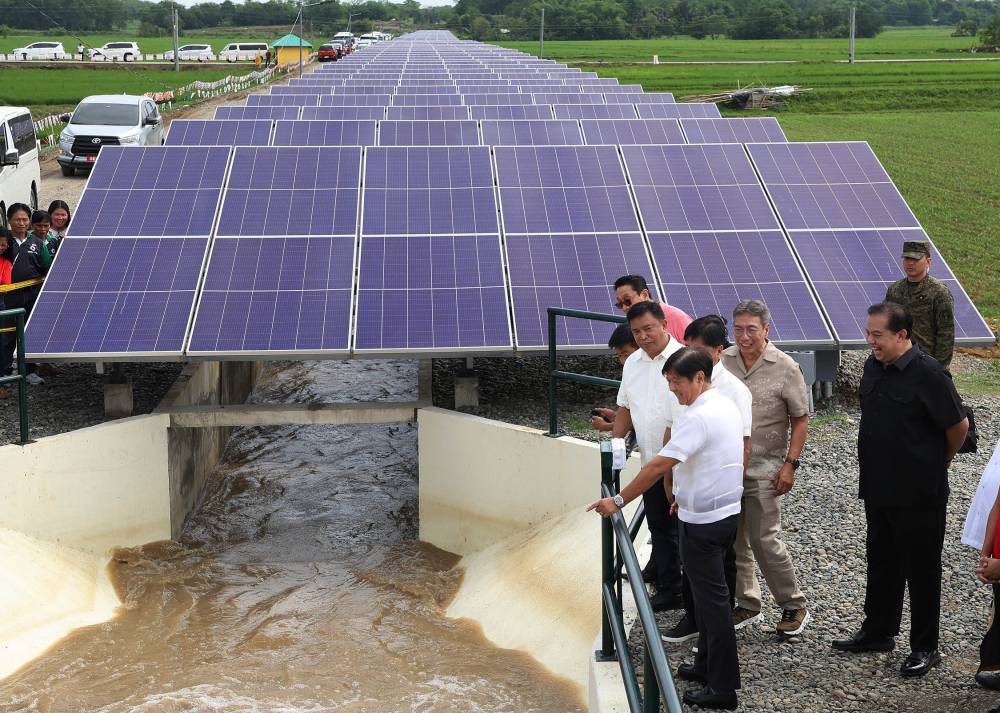
June 10, 2024
BIGGEST SOLAR IRRIGATION PROJECT: President Ferdinand Marcos Jr., with NIA (National Irrigation Administration) Acting Administrator Eng. Eduardo Guillen and other government officials, leads the inauguration of the solar-powered pump irrigation project in Quirino, Isabela in June 2024. INQUIRER file photo / MARIANNE BERMUDEZ
MANILA, Philippines — The solar irrigation project of the National Irrigation Administration (NIA) would be a game-changer for farmers because it would provide farmlands with much-needed water and increase yield, Ako Bicol Party-list Rep. Zaldy Co said.
Co in a statement on Thursday said that he supports the NIA’s Solar Irrigation project which includes 71 sites across Bicol Region, covering an area of 1,810 hectares — which will benefit 4,560 farmers in the region.
According to Co, chairperson of the House of Representatives’ committee on appropriations, the project has a total cost of P1.5 billion.
“This initiative by the National Irrigation Administration is a game-changer for our farmers,” Co said. “Tutugunan nito ang napakahalagang pangangailangan ng mga magsasaka sa patubig. Palalakasin nito ang ani at ang kakayahan ng mga magsasaka na pakinabangan ang kanilang mga lupain at mapataas ang kanilang kita.”
(It will address the crucial needs for irrigation of our farmers. This will boost yield and the farmers’ ability to utilize their land and increase their income.)
“With the availability of water during the dry season, we can expect an estimated additional income of P140 million every year for our farmers,” he added.
Co explained that most of the priority areas in the NIA’s project only rely on rain for irrigation, which limits planting season to a few times in a year. With the solar project, farmers can plant more — which will help in the government’s goal of self-sufficiency and food security.
“Our farmers are the backbone of our economy. Mahalagang bigyan natin sila ng kagamitan at resources na kailangan upang umunlad at mapalakas ang kanilang produksyon ng pagkain. This project not only boosts agricultural productivity but also uplifts the socio-economic status of our farmers,” he said.
(Our farmers are the backbone of our economy. It is important that we provide them with the equipment and resources needed to progress and boost food production.)
“As a representative of the Bicolanos, I am committed to ensuring that we continuously support and invest in our agricultural sector. Patuloy tayong makikipagtulungan sa mga ahensya ng gobyerno tulad ng NIA to ensure that projects such as these are successfully implemented and yield long-term benefits for our community,” he added.
(We will continue to help with different government agencies like NIA to ensure that projects such as these are successfully implemented and yield long-term benefits for our community.)
Co has been supportive of efforts to use solar power in agriculture. As early as March 2023, the lawmaker said that harnessing the power of sun will be key in boosting Philippine agricultural production, as combining the benefits of renewable energy, fertilizers and irrigation, which he called “fertigation,” would help increase farm yields.
Fertigation or the use of fertilizers and irrigation in raising crops, Co explained, is increasingly becoming popular among farmers as it feeds crops with precise amounts of nutrients while conserving water.
Adopting new farming technologies may be a game changer for farmers, he said, as it would boost production while reducing the use of resources.
READ: House appropriations chair says solar energy key to higher agri yield
Then in the deliberations for the 2024 national budget, Co’s committee approved a P40 billion increase for NIA’s allocation, to help it implement projects including solar-powered pump irrigation systems — which Administrator Eduardo Guillen said will revolutionize the country’s irrigation coverage.
READ: NIA exec says additional P40B to boost agricultural productivity
Irrigation will be crucial for the Philippines’ agricultural industry, especially since the country faces different calamities and phenomena — like the recent El Niño season which led to farm losses of P9.89 billion as of May 2024.
READ: Farm losses from El Niño climb to P9.89B
According to the Department of Agriculture (DA), the dry spell caused by the El Niño phenomenon affected the livelihood of 183,455 farmers and fisherfolk in the following regions:
- Cordillera
- Ilocos
- Cagayan Valley
- Central Luzon
- Calabarzon
- Mimaropa
- Bicol
- Western Visayas
- Eastern Visayas
- Zamboanga Peninsula
- Central Mindanao
- Davao
- Soccsksargen
According to President Ferdinand Marcos, over 152 solar-powered pump irrigation projects are being built across the country to combat the detrimental effects of El Niño, with 118 projects to be put up by the government.
Marcos also visited several areas recently, to provide aid and farm machinery for farmers and fisherfolk affected by the El Niño phenomenon. With reports from Felice Nafarrete, trainee